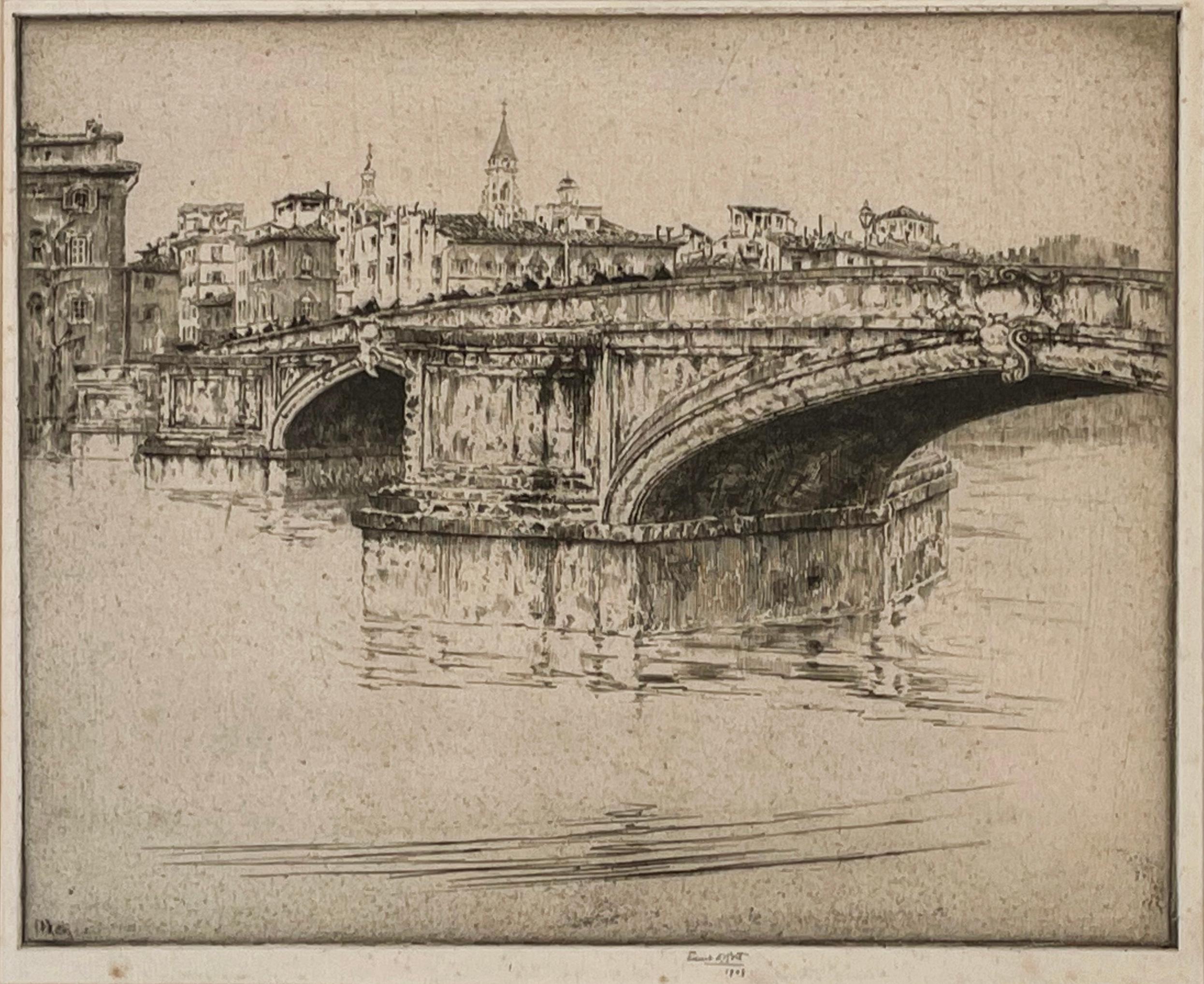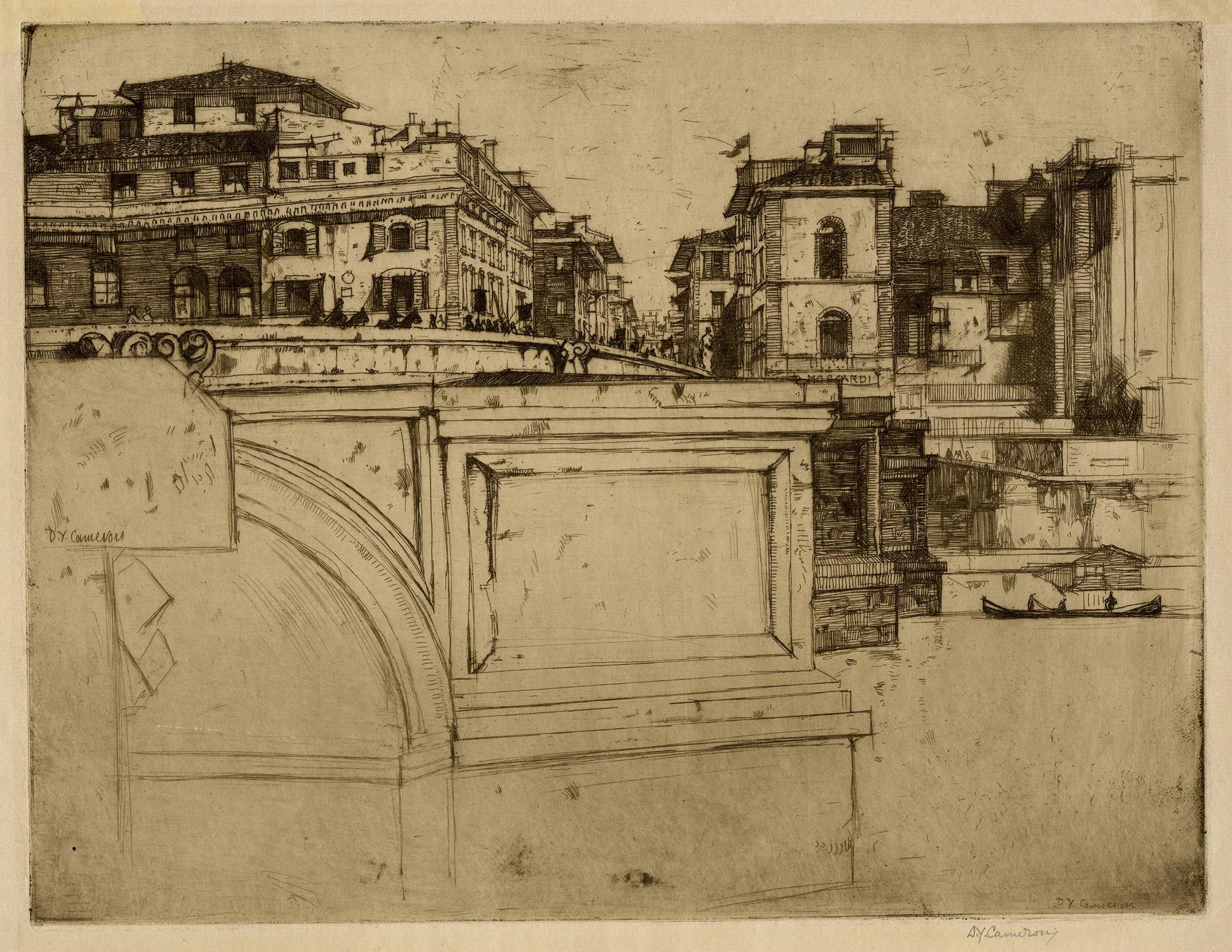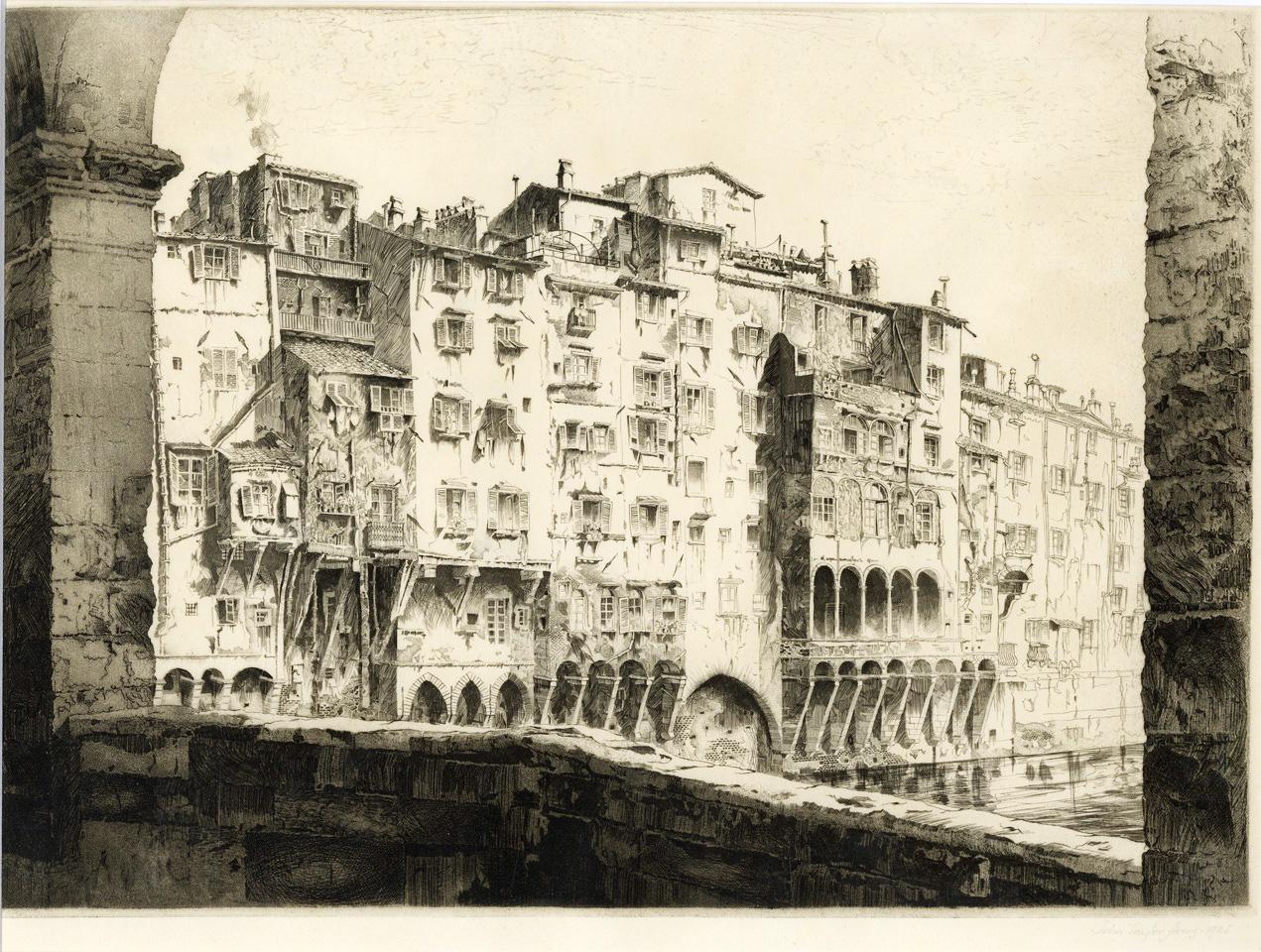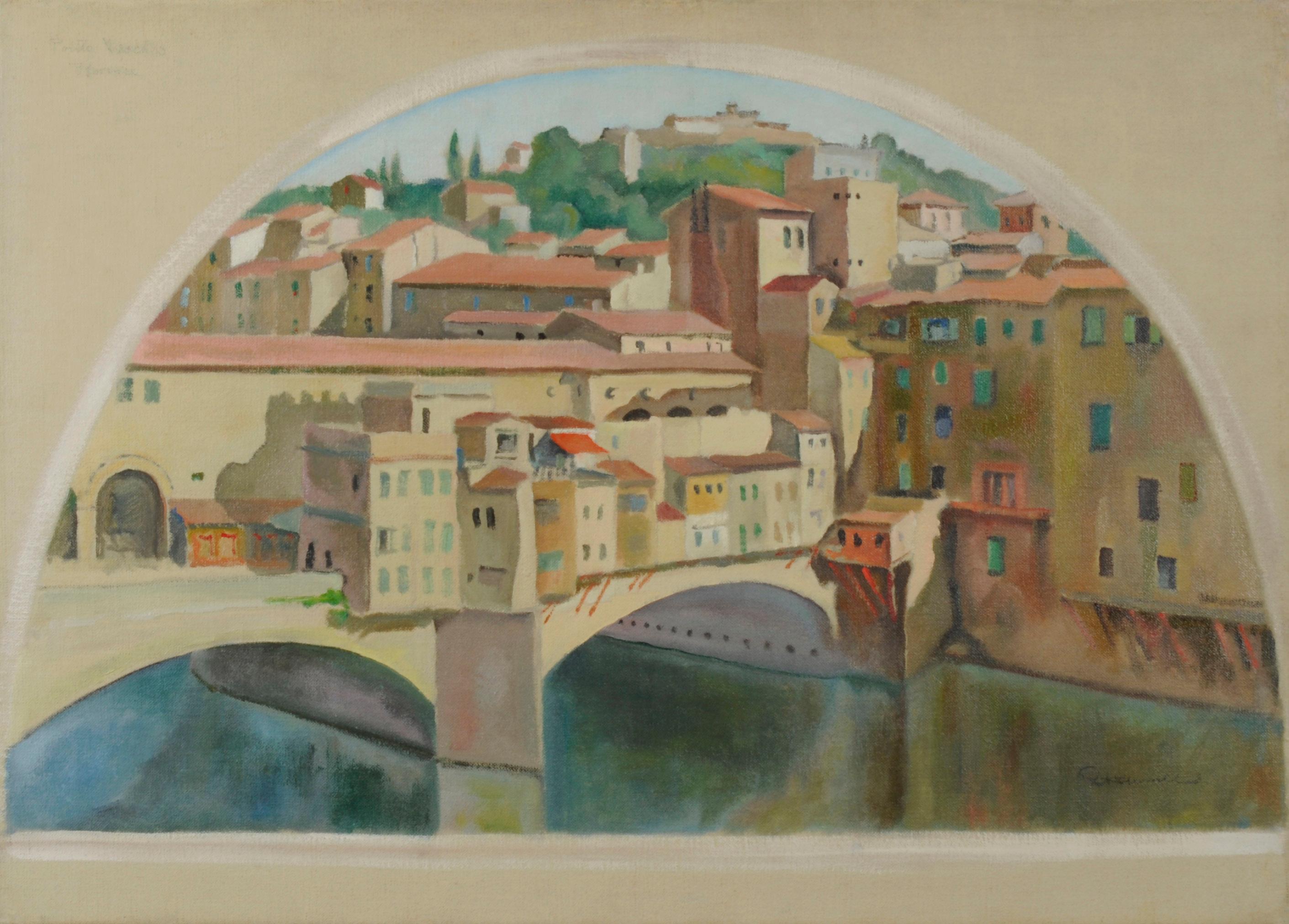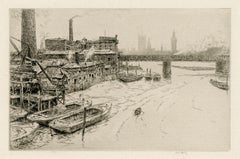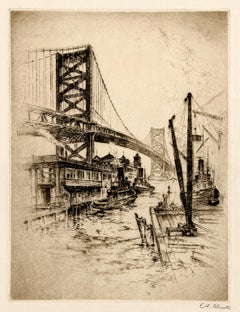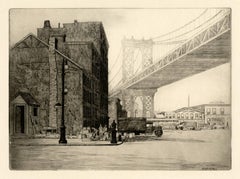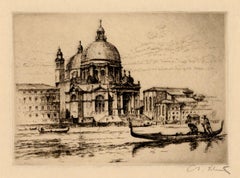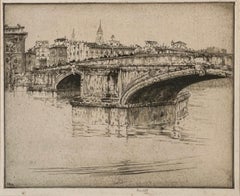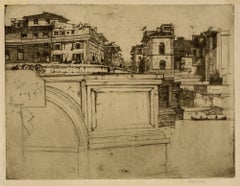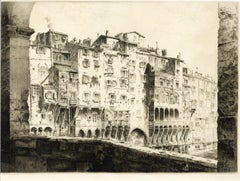Items Similar to 'Bridges of Florence' — Firenze Impressionism
Want more images or videos?
Request additional images or videos from the seller
1 of 6
Alonzo C. Webb'Bridges of Florence' — Firenze Impressionism1929
1929
$650
£485.52
€562.88
CA$902.51
A$1,011.60
CHF 526.71
MX$12,352.02
NOK 6,687.28
SEK 6,338.94
DKK 4,199.71
Shipping
Retrieving quote...The 1stDibs Promise:
Authenticity Guarantee,
Money-Back Guarantee,
24-Hour Cancellation
About the Item
Alonzo C. Webb, 'Bridges of Florence', etching, 1929, edition 100. Signed and titled in pencil. Signed and dated in the plate, lower left. A superb, richly-inked impression, in warm black ink, on cream wove paper, with full margins (2 to 3 1/2 inches), in excellent condition. Archivally matted to museum standards, unframed.
Image size 10 3/8 x 13 1/8 inches (264 x 333 mm); sheet size 15 x 19 7/8 inches (381 x 505 mm).
Ex-collection Kennedy Galleries, New York.
ABOUT THE ARTIST
Alonzo C. Webb (1888-1975) was an esteemed American etcher, architect, painter, and illustrator. Webb studied art at the Art Institute of Chicago and the Art Students League of New York. In the First World War, he served with the American Engineering Force in France, first as a sergeant and then as a commissioned second lieutenant. After the war, in 1918, he concluded his education at the American Expeditionary Forces Art Training Center in Bellevue, France.
During the 1920s and 1930s, Webb lived and worked in Paris and the United States. He produced an extensive oeuvre of beautifully rendered images of historic French and Italian architecture and views of American cities, including New York, Chicago, and Pittsburgh. Many of Webb's European works were published and exhibited by the Marcel Guiot Gallery, Paris.
Webb was a member of the American Art Association of Paris and the Beaux-Arts Architects. His etchings are included in the collections of The Art Institute of Chicago; Five Colleges and Historic Deerfield Museum Consortium, National Gallery of Art, New York Public Library, San Diego Museum of Art, Smithsonian American Art Museum, Yale University Art Gallery, and in the collections of the Government of France; the City of Paris, and the Bibliotheque Nationale (Paris).
- Creator:Alonzo C. Webb (1888 - 1975, American)
- Creation Year:1929
- Dimensions:Height: 10.38 in (26.37 cm)Width: 13.13 in (33.36 cm)
- Medium:
- Movement & Style:
- Period:
- Condition:
- Gallery Location:Myrtle Beach, SC
- Reference Number:Seller: 1008741stDibs: LU532310019172
About the Seller
5.0
Recognized Seller
These prestigious sellers are industry leaders and represent the highest echelon for item quality and design.
Platinum Seller
Premium sellers with a 4.7+ rating and 24-hour response times
Established in 1995
1stDibs seller since 2016
308 sales on 1stDibs
Typical response time: 1 hour
Associations
International Fine Print Dealers Association
- ShippingRetrieving quote...Shipping from: Myrtle Beach, SC
- Return Policy
Authenticity Guarantee
In the unlikely event there’s an issue with an item’s authenticity, contact us within 1 year for a full refund. DetailsMoney-Back Guarantee
If your item is not as described, is damaged in transit, or does not arrive, contact us within 7 days for a full refund. Details24-Hour Cancellation
You have a 24-hour grace period in which to reconsider your purchase, with no questions asked.Vetted Professional Sellers
Our world-class sellers must adhere to strict standards for service and quality, maintaining the integrity of our listings.Price-Match Guarantee
If you find that a seller listed the same item for a lower price elsewhere, we’ll match it.Trusted Global Delivery
Our best-in-class carrier network provides specialized shipping options worldwide, including custom delivery.More From This Seller
View AllHungerford Bridge, London
By Kerr Eby
Located in Myrtle Beach, SC
Kerr Eby 'Hungerford Bridge, London', etching and sandpaper ground, 1929, edition 90, Giardina 144. Signed, titled, and annotated 'Ed 90' in pencil. Signed again in the bottom right sheet corner. A fine, atmospheric impression, with delicate plate tone, on cream wove paper; the full sheet with margins (1 1/2 to 1 5/8 inches), in excellent condition. Matted to museum standards, unframed.
Hungerford Foot Bridge spans the River Thames in London, between Westminster Bridge and Waterloo Bridge. Eby visited Great Britain and France during 1924 and 1925.
Impressions of this work are in the permanent collection of the following institutions: American Academy and Institute of Arts and Letters, Arizona State University, Boston Public Library, Davison Art Center (Wesleyan University), Herbert F, Johnson Museum of Art, Huntington Museum of Art, Hood Museum of Art (Dartmouth College), Metropolitan Museum of Art, Montgomery Museum of Fine Arts, National Museum of American Art, New York Public Library, Smithsonian Museum of American Art.
ABOUT THE ARTIST
Kerr Eby was born in 1890 in Tokyo, Japan, the son of Methodist missionaries from Canada. The family returned to Vancouver when Eby was only three, and he grew up studying art encouraged by his parents as his mother was from a family of prominent artists. By age twelve, he had lived in Vancouver, Kingston, Toronto and Bracebridge where he found work as a ‘printer’s devil’ on the local Bracebridge newspaper.
After graduating from high school in 1907, Eby moved to New York City to study art, first at the Pratt Institute, and later at the Art Students League. He enrolled in art classes at Pratt Institute while working for a lithographic firm earning $4.00 a week. His pay barely covered his room and drawing supplies. Within a year, starving and feeling defeated, he returned to Canada and was employed by a surveying party in Northern Ontario. Eby gradually regained his dream of becoming an artist, and in his spare time, he began to draw the surrounding wilderness landscapes. By fall he had returned to New York to attend night classes at the Art Students League while working for another lithographic firm. He spent several more summers surveying in Northern Ontario before he was able to make a living as an illustrator. During this period he formed several friendships with influential artists including John Henry Twachtman and Childe Hassam and joined a summer artists' colony founded by them at Cos Cob, Connecticut. He supported himself by working as a magazine illustrator and at the American Lithographic Company. Through diligent study and practice, Eby refined both his drawing and printmaking techniques.
In 1917, when the United States entered World War I, Eby joined the U.S. Army. Failing to obtain a commission as an artist, he was assigned first to ambulance duty and later as a sergeant in the 40th Engineers in France. He spent most of WWI on the front line as a camouflager of the field artillery ‘big guns”. On his time off duty, he would sketch everything he witnessed, from the explosive big guns and men in action to the dead soldiers in the field. He sent the drawings home each week, and upon his return from the war, they became the basis for his first successful group of etchings. He continued creating his war-related prints throughout the 1920s and '30s as his work became widely exhibited Frederick Keppel, the renowned print dealer and a relative of Eby, became the exclusive agent for many of his print editions.
With another global conflict beginning in the mid-1930s, Eby wanted to show the world the true face of war...
Category
1920s Impressionist Landscape Prints
Materials
Etching
'Delaware River Bridge' — Mid-Atlantic Regionalism
By Anton Schutz
Located in Myrtle Beach, SC
Anton Schutz, 'Delaware Bridge' (Delaware, New Jersey), etching, c. 1927. Signed in pencil. A superb, richly-inked impression, with skillfully wiped plate tone, on BFK Rives, cream wove paper, the full sheet with margins (1 1/2 to 2 1/8 inches), in excellent condition. Archivally matted to museum standards, unframed.
Image size 11 7/8 x 8 7/8 inches (302 x 225 mm); sheet size 15 7/8 x 12 1/4 inches (403 x 311 mm).
ABOUT THIS IMAGE
The Benjamin Franklin Bridge, originally named the Delaware River...
Category
1920s Realist Figurative Prints
Materials
Etching
Manhattan Bridge — 1920s New York City
By George Stimmel
Located in Myrtle Beach, SC
'Manhattan Bridge', etching, c. 1920, proofs only. Signed in ink in the image, lower right. A fine, rich impression, in warm black ink, on cream wove ...
Category
1920s American Realist Landscape Prints
Materials
Etching
'Venice, Maria della Salute' — Serenissima Impressionism
By Anton Schutz
Located in Myrtle Beach, SC
Anton Schutz, 'Venice, Maria della Salute', etching, c. 1930. Signed and titled in pencil. A superb, richly-inked impression, with skillfully wiped plate tone, on cream wove paper, ...
Category
1930s Realist Figurative Prints
Materials
Etching
Pont Marie, Paris — Mid-Century Photogravure
Located in Myrtle Beach, SC
Rémy Duval, 'Pont Marie, Paris', photogravure, 1946. A fine, richly-inked impression in warm black ink, on cream wove B.F.K. Rives paper; the sheet with dec...
Category
1940s Modern Figurative Photography
Materials
Photogravure
'L' Abside de Notre Dame' — Vintage 1920s Paris, Realism
By Anton Schutz
Located in Myrtle Beach, SC
Anton Schutz, 'L' Abside de Notre Dame' (The Apse of Notre Dame), etching, 1st state, c. 1927. Signed, titled, and annotated 'First State', in pencil. A supe...
Category
1920s Realist Figurative Prints
Materials
Etching
You May Also Like
PONTE DEL TRINITE, FLORENCE
By Ernest David Roth
Located in Portland, ME
Roth, Ernest (American, 1879-1964). PONTE DEL TRINITE, FLORENCE. Etching, 1908. Signed and dated in pencil, and inscribed by Roth with tthe title and date, and numbered "26", at the ...
Category
Early 1900s Landscape Prints
Materials
Etching
Ponte della Trinità, Florence
By David Young Cameron
Located in Middletown, NY
Etching and drypoint on tissue-thin cream laid paper, 6 5/8 x 8 1/8 inches (167 x 205 mm), full margins. Signed in pencil in the lower right margin, and inscribed "Ponte Trinità, Florence" in pencil the lower left margin. Non-archival paper tape tabs at the top right and left corners on the verso, with minor associated discoloration which presents on the recto. Minor, light mat tone, and some very small losses at the extreme corners, well outside of image area. The numerals "325" written in pencil in the lower right margin, in reference to the Rinder catalog number. A beautiful, silvery, early-state impression.
Rinder 325
[Rinder 325 iii/vii].
The son of a clergyman, Sir David Young Cameron was born in Glasgow in 1865. After a brief and unhappy dalliance in the fields of business and law, Cameron began attending the prestigious Glasgow School of the Arts in 1881, and later the Edinburgh School of the Arts. At first associated with the Glasgow Boys (John Lavery, Joseph Crawhall...
Category
Early 20th Century Modern Landscape Prints
Materials
Laid Paper, Drypoint, Etching
"Florence´s Bridge", 19th Century Oil on Canvas by Antonietta Brandeis
By Antonietta Brandeis
Located in Madrid, ES
ANTONIETTA BRANDEIS
Czechoslovakian, 1848 - 1926
FLORENCE´S BRIDGE
signed "ABrandeis" lower right
oil on canvas
10-3/5 x 14-4/5 inches (27 x 37.5 cm.)
unframed
PROVENANCE
Private Collection, Barcelona
Antonietta Brandeis (also known as Antonie Brandeisová) (1848–1926), was a Czech-born Italian landscape, genre and portrait painter, as well as a painter of religious subjects for altarpieces.
She was born on January 13, 1848, in Miskovice (near Kutná Hora) in Bohemia, Austria-Hungary.[2] The first bibliographical indication of Antonietta Brandeis dates from her teens, when she is mentioned as a pupil of the Czech artist Karel Javůrek of Prague.[3] After the death of Brandeis' father, her mother, Giuseppina Dravhozvall, married the Venetian Giovanni Nobile Scaramella; shortly afterward the family apparently moved to Venice.
In the 1867 registry of the Venetian Academy of Fine Arts, Brandeis is listed as being enrolled as an art student. At this time, Brandeis would have been nineteen, and one of the first females to receive academic instruction in the fine arts in Italy. In fact, the Ministry granted women the legal right to instruction in the fine arts only in 1875, by which time Brandeis had finished her education at the Academy.
Brandeis’s professors at the Venetian Academy of Fine Arts include Michelangelo Grigoletti and Napoleone Nani for life drawing, Domenico Bresolin for landscape, Pompeo Marino Molmenti for painting and Federico Moja for perspective. Already during her first years of study there is evidence of Brandeis' skill-in her first year she is awarded prizes and honors in Perspective and Life Drawing. Brandeis’ continuing excellence and diligence in her artistic studies during the five years she spends at the Academy is attested to in the lists of prize-winning students of the Academy “Elenco alunni premiati Accademia Venezia in Atti della Reale Accademia di Belle Arti in Venezia degli anni 1866-1872”.[4] It includes numerous mentions of prizes and high honours won by Brandeis in Art History, Perspective, Life Drawing, Landscape and Anatomical Drawing, Drawing of Sculpture, and “Class of Folds”.
It is in Venice at the Academy that Brandeis perfected her skills as a meticulous landscape and cityscape painter, with intricate and luminous details in the tradition of the eighteenth-century “vedutisti”. In 1870, while still a student at the Academy, she participated in her first exhibition; that of the Società Veneta Promotrice di Belle Arti with the oil painting Cascina della Madonna di Monte Varese. She is documented as having exhibited eight paintings during the years 1872 to 1876 with the Società Veneta Promotrice di Belle Arti, both landscapes and genre scenes. In the exhibit of 1875 her landscape Palazzo, Marin Falier is sold to M. Hall of London for 320 lire, a first indication of the success Brandeis will achieve with foreign collectors of her work (particularly the English and German visitors to Italy on the Grand Tour circuit). During these same years, she showed two paintings in the Florentine exhibit Promotrice Fiorentina. The first painting, entitled “Gondola” is a subject which she repeats in new variations throughout her career with great success. The second, perhaps a genre painting, is entitled “Buon dì !” The two paintings remained unsold and were presented at the same exhibition the following year, together with two more genre scene paintings.
In 1876 and 1877 she exhibited three landscapes of Venice at the Promotrice Veneta, which sold to foreign collectors. In November 1877 Brandeis showed the large painting Palazzo Cavalli a Venezia at the exhibition of the Hungarian Fine Arts Society in Budapest. In both Florence and Budapest, Brandeis showed her work under the name “Antonio Brandeis”. The biographer De Gubernatis offers the following explanation for the change of name: “her first pictures received praise and criticism; she took the criticism, but when she was praised as a woman she was annoyed, and therefore exhibited under the name Antonio Brandeis.”
During the years 1878 to 1893 Brandeis painted and exhibited numerous works, primarily scenes of Venice, and although she resided chiefly in that city she also traveled and painted in Verona, Bologna, Florence, and Rome. As well as in Venice and Florence, she exhibited in Turin, Milan, and Rome. In 1880 she was present at the International Exposition of Melbourne with three paintings: Palazzo Cavalli, A Balcony in Venice and The Buranella- native of Burano Island near Venice.
Brandeis was a prolific painter, and often replicated her most popular subjects with only slight variations. She was represented in Venice at the photographer Naya’s studios in Piazza San Marco and in Campo San Maurizio and in Florence she collaborated with the picture dealer Giovanni Masini.
During this period of intense activity painting landscapes en plein air and genre scenes, Brandeis also is documented in De Gubernatis as a painter of religious altarpieces. Several of these altarpieces can be found on the Island of Korcula in Croatia. Two are visible in the parish church of Smokvici and of in the church of St. Vitus in Blato. In the sacristy of the Cathedral of Korcula is a Madonna with Christ Child painted by Brandeis. For the same church she also painted a copy of the central panel of Giovanni Bellini’s triptych from the Venetian Church of Santa Maria dei Frari Gloriosa (1488). In 1899, for the main altar of the chapel of St. Luke in the Korcula town cemetery, Brandeis painted a St. Luke, which shows the sparkling colors and free impasto typical of her plein air oil paintings.
On October 27th 1897 at the age of 49, Brandeis married the Venetian Antonio Zamboni, a knight and officer of the Italian Crown and knight of the Order of SS. Maurizio and Lazzaro. The couple continued to reside in Venice and Brandeis continued to show at Italian exhibitions in Venice, Florence, and Rome although more sporadically and with fewer works than before. Although she participated in the International Exposition of Watercolourists in Rome in 1906 with a “Study” and in the Società Promotrice delle Belle Arti in Florence in 1907 and 1908 with two oil paintings, De Gubernatis quotes Brandeis as saying in 1906, that even though she resides in Venice “I am a foreigner, and for some time I have not taken part in Italian Exhibitions, sending all my paintings to London.[3] Antonio Zamboni died 11...
Category
1890s Realist Figurative Paintings
Materials
Canvas, Oil
From the Ponte Vecchio, Florence
By John Taylor Arms
Located in Middletown, NY
Etching and aquatint on hand made F.J. Head & Co watermarked cream laid paper, full margins. Signed and dated in pencil, lower right margin. From the edition of 160 (from a total of ...
Category
1920s American Modern Landscape Prints
Materials
Handmade Paper, Laid Paper, Etching, Aquatint
Ponte Vecchio Florence
By Robert Hallowell
Located in Fairlawn, OH
Ponte Vecchio Florence
Oil on canvas, 1927
Signed and dated lower right corner
Titled upper left
NOTE: this offering is UNFRAMED
Condition: Excellent
Conservation by Monica Radecki, ...
Category
1920s American Impressionist Landscape Paintings
Materials
Oil
Pont Neuf Bridge, France 1906
By Clarence Keiser Hinkle
Located in Sheffield, MA
Clarence Keiser Hinkle
American, 1880-1960
Pont Neuf Bridge, France 1906
Oil on board
10 ¾ by 13 ¾ in, w/ frame 18 by 21 in
Signed lower right
An academy trained California painter...
Category
Early 1900s American Impressionist Landscape Paintings
Materials
Oil
More Ways To Browse
Antique Bridges
Antique Florence
Firenze Plate
Dali The Golden Age
Mother Child Africa
Pablo Picasso Two Women
Picasso Drypoint Etching
Rabbi Drawing
Vintage Book Clocks
Vintage Travel Posters Book
William Vincent
Bas Relief Portrait
Estampe Moderne
Henri Matisse Jazz
Hokusai Woodblock Prints
Louis Vuitton Pop Art
Paul Eluard
Pencil Drawing Of Woman 19th Century
